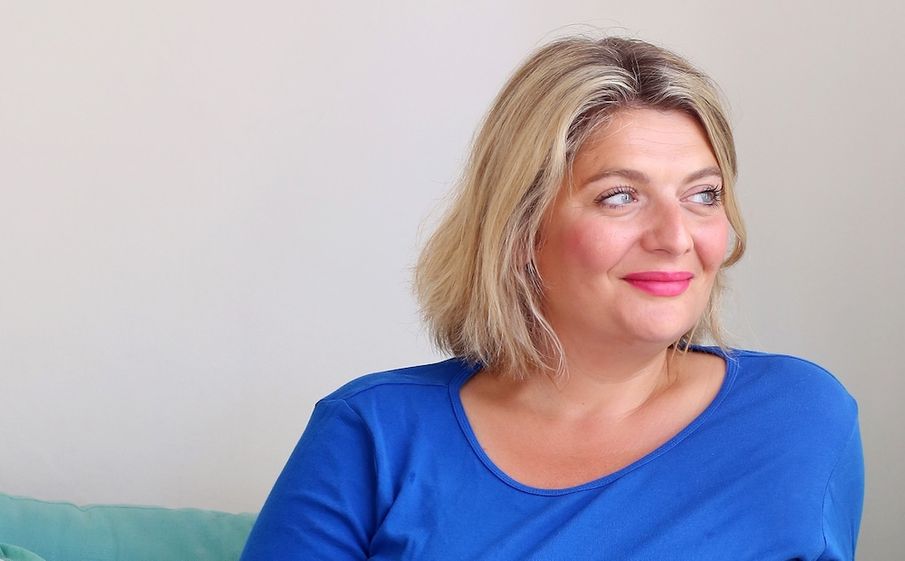Founder of Mental Health Mates, writer and podcast host Bryony Gordon shares her thoughts about working on wellness, understanding your inner voice, and building personal resilience
Chatting with Bryony Gordon is like picking up a conversation you put on hold to answer the door. It feels familiar, every day, and easy. She has a knack of speaking about some of the toughest topics in mental health with a normality that encourages others to open up too, which is why she’s interviewed everyone from Prince Harry to frontline nurses, witnessed their darkest reflections, and shared their hopes with millions of listeners on her podcast ‘Mad World’.
If we all have a superpower then Bryony’s, I suspect, is being very real and honest about what she believes in. That hasn’t always been the case, as since she’s lived with Pure O (a form of obsessive compulsive disorder centering around often deeply frightening, intrusive thoughts) since her pre-teens, Bryony spent many of her formative years suppressing what she was really thinking, for fear of the reaction from others.
Today, and as a result of much work on herself, Bryony is one of the country’s most well-known mental health advocates, and has opened up a vast number of conversations about the need to smash the stigma that still sadly exists around mental ill-health. She’s adamant about her status within that conversation too; Bryony maintains she’s a constant work in progress, learning about herself as she shares with others through her podcast, talks and books, the latest of which is No Such Thing as Normal.

"Through being very unwell, I have learnt an awful lot about being well"
Here, Bryony shares five personal insights about living with mental ill-health, reflections on the past year, and finding your inner strength.
The impact of mental ill-health can be surprising
I’ve had OCD since I was a little girl, and my first manifestation was an overwhelming fear of germs. So when the pandemic hit, it didn’t trigger me in the way you might think. I realised that nothing I could do would change the situation, and the fact that we were all locking down together felt like a walk in the park compared with the times I’ve had to lockdown in my head all alone. I think that perspective might resonate with a lot of people who have experienced mental illness.
Know that your inner voice isn’t always right
I imagine my OCD and alcoholism as a figure that’s invaded my brain, and it has a voice that’s indistinguishable from my own, so I think it’s me, and I have to remind myself that it’s not. Sometimes if I want to do something, I shouldn’t do it, and if I don’t want to do something, I should do it! For example, I don’t want to get out of bed, I don’t want to go for a run – but I tell myself to just do it. We really have to recognise that our brains don’t always want the best for us, and circumvent that.
We need to work at wellness
When I first got sober, the cravings for alcohol were there every night for months. I was physically exhausted from fighting them and the thought that it would be easier to give in. Now, alcohol crosses my mind occasionally, but I just think “that’s interesting, my brain is telling me I should have a drink, better short-circuit that” and I move onto the next thing. The more we work at our wellness and learn, the easier it gets.
"I can say now that some of the best things in my life have come from some of the worst"
Our life and health evolves
I realised that I was using food as a real comfort throughout lockdown, in the same way that lots of people were using alcohol – but that’s not an option that’s open to me.
I was bulimic for 10 years of my life, and I thought that because I wasn’t purging, I was only bingeing, it was fine. But I came to understand through writing No Such Thing As Normal that I’ve been brought quite low through binge-eating, so now I’m going to do some work around that. Life is a process, and these things happen to us as our lives evolve.
Mental illness can build your personal resilience
Through being very unwell, I have learnt an awful lot about being well. I’m not saying that mental ill-health is a gift, because clearly it’s not. I can’t change it though – my brain, for some reason, has chosen to create some coping mechanisms that don’t work. So I have to work with what I have, and through doing that I’ve realised that I am actually quite a resilient person – I’m quite strong! I can say now that some of the best things in my life have come from some of the worst.
No Such Thing as Normal by Bryony Gordon is out now (Headline, £14.99).
You can also listen to Bryony’s thoughts on mental health and learning every day on Happiful’s podcast, ‘I am. I have’.


Comments